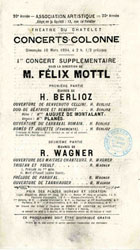
![]()
Conductors: Felix Mottl (1856-1911)
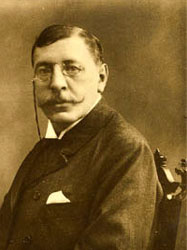
 |
Conductors: Felix Mottl (1856-1911)
|
 |
Introduction
Sources
Mottl and Wagner
Mottl and Liszt
Mottl’s repertoire
Mottl and Berlioz
Mottl and Paris
Mottl as a conductor
Epilogue
Chronology
Illustrations
This page is also available in French
Copyright notice: The texts, photos, images and musical scores on all pages of this site are covered by UK Law and International Law. All rights of publication or reproduction of this material in any form, including Web page use, are reserved. Their use without our explicit permission is illegal.
![]()
Note: the following abbreviations have been used —
Delage = Roger Delage, Correspondance inédite
entre Emmanuel Chabrier et Félix Mottl, Société Française de Musicologie,
vol. 49 no. 126 (1963), pp. 61-107
Haas = Frithjof Haas, Der Magier am Dirigentenpult: Felix
Mottl (Karslruhe, 2006)
Krienitz = Felix Mottls Tagebuchaufzeichnungen aus den
Jahren 1873-1876, mitgeteilt von Willy Krienitz, in Neue Wagner-Forschungen,
Veröffentlichungen der Richard-Wagner-Forschungsstätte, Bayreuth. Hg. von Otto
Strobel, Karlsruhe 1943, pp. 167-208
Among the profusion of outstanding musicians produced by Germany in the late 19th century, Felix Mottl (1856-1911) holds a special place as one of the greatest conductors of his time and a champion of the music of many composers, including that of Berlioz. Exceptionally talented and hard-working, open-minded and inquisitive, a cultured man who made many friends and had few enemies, he had a vast musical repertoire: it ranged across national and temporal borders, from the 18th century to the music of his own time, and embraced both the great classics of the past and little-known composers of his day. As far as Berlioz is concerned, Felix Mottl was without question the composer’s outstanding champion in Germany for some 3 decades from the 1880s till the time of his death, and the counterpart to Édouard Colonne in France, though with one important proviso: whereas Colonne was active predominantly in the concert hall and did little to promote Berlioz’s operas on stage, Felix Mottl’s sphere of action embraced both the opera house and the concert hall. He was thus able to do equal justice to Berlioz’s orchestral, choral and operatic output, and it is to Mottl’s permanent credit that he was the first conductor to perform all the operas of Berlioz on stage, and in particular to have resurrected Les Troyens and performed it on repeated occasions as one single work and not two separate operas.
Yet for all his many achievements, Felix Mottl’s posthumous reputation is perhaps not as great as it deserves to be. Among German conductors who championed Berlioz he is less well known than, for example, his elder Hans von Bülow (1830-1894) who did much less for Berlioz than Mottl did. Thanks to his strong personality and to some very unusual features of his life, notably in his relations with Wagner, Bülow attracts more attention, and he has the important advantage that through the devotion of his widow Marie von Bülow a substantial part of his correspondence and papers were collected and published after his death. Mottl’s younger contemporary Felix Weingartner (1863-1942), for his part, outlived him by many years and so has enjoyed the benefit of having some of his performances recorded for posterity during the 1920s and 1930s, including his interpretations of all the Beethoven symphonies and the first known recording of the Symphonie fantastique (1925). Weingartner also published a number of books, which Mottl did not, and was a prolific composer who devoted much time to his own output, which includes no less than 7 symphonies. Felix Mottl, on the other hand, though a composer as well as a conductor, as were most German conductors of the time, composed less (notably two operas, Agnes Bernauer and Fürst und Sänger, a dance-play Pan im Busch, a string quartet and several melodies; for a full list see Haas pp. 385-9, and pp. 361-83 on Mottl as a composer). But in any case he did not attach too much importance to his own music: an entry in his diary for 15 June 1874 notes his joy at hearing a youthful symphony of his performed, and adds a retrospective comment: ‘I am convinced that I am at least a great composer! But time showed this to have been an even bigger mistake’ (Krienitz, p. 182 — see below). Mottl is more likely to be known through his numerous arrangements or the orchestration of the music of others: for example, he orchestrated four of Wagner’s Wesendonck Lieder at the request of Cosima Wagner (for a list of his arrangements see Haas pp. 403-11).
This page will naturally concentrate on Felix Mottl as a champion of Berlioz, but will also consider Mottl’s career and repertoire as a whole to provide the necessary context (a chronological outline of his career is provided separately below).
Felix Mottl did not write any autobiography (unlike Weingartner, for instance, among conductors), and as late as 1909 when already in his fifties he showed no interest in having a biography written of himself (Krienitz, pp. 167-8). As a person, one of Mottl’s characteristics was his total lack of vanity: he found it hard to imagine that future generations might be interested in his life. What Mottl did begin to write from an early stage in his career, while a teenager and still a student, was a personal diary; it was started on 1 January 1873 and continued till 21 June 1911, not long before his death. In it Mottl recorded whatever seemed to him of interest in his daily life: this revolved primarily around his innumerable musical activities, but extended also to his social life and numerous cultural interests (he was for example widely read in German and French literature, and took advantage of his travels abroad to visit museums and art galleries). According to Willy Krienitz (1882-1954), who was the personal secretary of Mottl in Munich in the years 1906 to 1911, after being secretary to the conductor Ernst von Schuch in Dresden from 1902 to 1905, Mottl made a point of maintaining the diary without interruption, whatever the pressures of an exceptionally busy life. But because of time constraints he was frequently unable to keep more than a sketchy record; the diary had no literary pretensions and was never meant for publication. It was only during his trip to the United States in 1903-1904 that Mottl had the leisure to set down a fuller account. Excerpts from the diary for this American period are reproduced by Haas (pp. 223-60), and they give a tantalising glimpse of what the diaries might have been had Mottl been able to devote more time to them (the complete diaries for the American trip run reportedly to some 250 pages). In 1909 Krienitz persuaded Mottl to revise the earlier part of the diaries and add from memory any details not recorded there, and Mottl wrote out an edited and somewhat enlarged version of the early years down to the end of August 1876. This was subsequently published by Krienitz in 1943 with detailed annotations, and this part of the diary provides very suggestive insights into Mottl’s early career and outlook (see below). But the rest of the diary, except for the American excerpts reproduced by Haas, has not been published and may have more information to yield. It is currently preserved, together with many other papers of Mottl, in the Bayerische Staatsbibliothek in Munich.
The same holds good for Mottl’s correspondence, which remains as yet largely unpublished. Mottl was very close to Cosima Wagner: she was the daughter of Liszt and the second wife of Wagner, the two living composers who had most influenced Mottl’s early career. The correspondence between Mottl and Cosima was very extensive: it lasted more than 2 decades and ran to some 500 letters on each side (on their relations see Haas pp. 73-95). A much smaller part of Mottl’s correspondence, that with the composer Emmanuel Chabrier (1842-1894) has been published (see Delage). It covers a short period of time, from 1887 to 1894, but gives a valuable insight into the relations between the two men (see below). The correspondence was conducted mostly in French, and this reveals Mottl’s sometimes tentative command of the written language — he was the first to admit it — but he could read and understand the language well, and sustain a conversation in French (he was widely read in French literature, and in general an avid reader like Berlioz himself: Shakespeare was one of his favourites, though he probably read him in translation). He could also manage a conversation in Italian. But he could not match the linguistic skills of Hans von Bülow. His knowledge of English was initially weaker, as shown by an unfortunate lapse at a rehearsal in London in 1897 which caused much amusement among orchestral musicians working there.
As early as 1911 it was reported that Krienitz was preparing a biography of Mottl. Yet more than 30 years later, Krienitz himself referred to that biography as work still in progress (Krienitz, p. 169), and when he died in 1954 it was left unfinished and never appeared (it is not clear what has happened to any drafts he may have written, and Haas is silent on this point). Mottl thus had to wait till 2006 before he received his first and detailed biography, in the book by Frithjof Haas, Der Magier am Dirigentenpult: Felix Mottl [The Magician at the Podium: Felix Mottl]. Based on a close study of all the unpublished manuscript material mentioned above, as well as the contemporary press, especially German, this forms the starting point for any future investigation into the career of Mottl (unfortunately the author does not provide a consolidated bibliography of published works used; there are also some gaps in his information). Naturally, the focus of Haas’ biography is on Mottl’s career as a whole rather than any particular aspect of it (such as Mottl’s championship of Berlioz). Extensive use has been made of it in the preparation of the present page, which is illustrated by a companion page of texts relating to the career of Mottl; most of these are in French and taken from the weekly journal Le Ménestrel, while a few are in English from the Musical Times, and there are also a few short excerpts from Chabrier’s correspondence with Mottl (see the separate introduction to that page). A chronological section below outlines the main events in Mottl’s career, with particular reference to his championship of Berlioz, but it has not been possible to provide a comprehensive listing of all his Berlioz performances (as can be done for the careers of Pasdeloup, Colonne and Lamoureux in Paris). The material for this lies scattered in all the unpublished papers of Mottl and in the contemporary press of several countries, and at the moment there is no equivalent for Mottl’s career to the comprehensive listing drawn up for Hans von Bülow by Kenneth Birkin (Hans von Bülow. A Life for Music, Cambridge, 2011, pp. 387-699).
The published part of Mottl’s diary for the years 1873 to 1876 illustrates a number of themes that were to run through the whole of Mottl’s life. One is his devotion to the theatre. The entry for January 1873 begins with the words ‘Great interest in the theatre’ and goes on to list no less than 9 performances of operas he heard that month alone, including 2 of Mozart, 2 of Weber, and 3 of Wagner; this pattern is maintained in the sequel of the diary (Krienitz, p. 174). In his subsequent career, Mottl’s two major appointments, that at Karlsruhe from 1880 to 1903 then in Munich from 1904 to 1911, were in the first instance as conductor at the opera; over his career as a whole, though he was equally at home in the concert hall and in the opera house, he probably conducted even more operas than he did orchestral concerts. For example, during his time in Karlsruhe he conducted some 313 staged performances of Wagner alone, according to Le Ménestrel, which then gives a detailed breakdown for each opera (25/10/1903). As an operatic conductor Mottl was noted for his total command of the works he directed: he had trained the orchestra so well that during the performance he could devote most of his attention to the singers on stage, hence operatic performances under his direction had a special feeling of coherence and unity (see for example the report by Albéric Magnard on the rehearsals for les Troyens at Karlsruhe in December 1890, and also Le Ménestrel 11/1/1908).
Another major theme which is prominent from the beginning is Mottl’s devotion to Wagner, and in his 1909 revision of his diary Mottl brought this out even more explicitly. For example, as well as listing numerous performances of Wagner he attended in Vienna, he expresses outrage at the ‘miserable cuts’ made at a performance of Meistersinger on 31 January 1873 (Krienitz p. 174). In February he joins other enthusiasts in the foundation of a Wagner Society in Vienna (Krienitz p. 176). On Christmas day 1873 he begins to study Tristan and ‘is stricken with longing for that work’ which he ‘carries around with him like the picture of his sweetheart’; on New Year’s day 1874 he ‘is completely crazy about it’ (Krienitz p. 180). On 21 February 1875 when Wagner arrives in Vienna to give a concert, Mottl together with fellow-admirers (these included Bruckner) ‘waits for him at the station with beating heart’ and is ‘overjoyed to see the wonderful master’; when Wagner invites him to breakfast he ‘feels like a king and greets acquaintances in the street de haut en bas’ (Krienitz p. 185). On 2nd March 1876 he hears Wagner conducting Lohengrin himself and comments on ‘the wonderful power of suggestion of his personality’ and the ‘technical perfection of the whole performance. It was a wonderful evening’ (Krienitz p. 190). This was the performance that in later years Mottl regarded as a decisive event in his life (citation in Krienitz, p. 173). On 20 May of the same year Wagner then invited Mottl to come and assist in the rehearsals for the opening of the Bayreuth festival, and Mottl stayed there from 22 May to the end of August. The diary records the stay in detail and prefaces the year 1876 with the comment: ‘The Bayreuth year! This is the most important year in my artistic development and it has marked me for all time. I had the joy of being in personal contact with Richard Wagner for 3 months and to learn what an enthusiastic student can learn from the greatest of masters. Everything that I am capable of I owe to this period of learning in Bayreuth. From this time on I begin to think of art as the main purpose of my life’ (Krienitz p. 189).
Though Mottl was much too young to conduct at the opening festival (Hans Richter was in charge), the fruits of his stay in Bayreuth came in subsequent years. Wagner was impressed with the devotion and abilities of the young man and gave him his full endorsement. A letter of his to Mottl dated 1 May 1882, by which time Mottl was in his post in Karlsruhe, begins as follows: ‘I am told that you are going to stage Don Giovanni. I am delighted for you; you understand Tristan so well, and you understand better than anyone else the meaning of love. You have displayed so much beauty and heavenly charm in my Tristan und Isolde that I am proud to be able to entrust my works to you’ (Le Ménestrel 20/4/1912, p. 127). Mottl, unlike others such as Hans von Bülow or indeed Berlioz himself, could have nothing but positive feelings towards Wagner himself, and these extended to Wagner’s family. He became very friendly with Wagner’s widow Cosima and later his son Siegfried, and invitations to conduct at Bayreuth followed, for the first time in 1886, then again repeatedly in 1888, 1891, 1892, 1894, 1896, 1897, 1901, 1902; his last appearance there was in 1906. From the late 1890s Mottl was increasingly in demand as a Wagner conductor abroad as well as in Germany, and in addition to numerous performances of Wagner in the concert hall he gave staged performances of several operas in London (1898, 1899, 1900), Belgium (1902, 1904, 1907), several cities in the United States (1903-4), and eventually in St Petersburg as well (1911). After his return from the United States his centre of gravity moved to Munich; this led to some estrangement from Cosima, but his devotion to Wagner continued unabated. He gave numerous performances of Wagner’s operas there in 1905 and 1906 and made Munich almost a rival centre to Bayreuth, as he had done previously in Karlsruhe. It was while conducting in Munich his 100th performance of Tristan that Mottl was taken ill on 21 June 1911 and died ten days later (Le Ménestrel 1/7 and 8/7/1911).
Throughout his career Mottl maintained his devotion to Wagner. In 1903 he and Hans Richter refused to be associated with concerts to celebrate the inauguration of a Wagner monument in Berlin, on the grounds that Wagner himself disapproved of such celebrations. During his trip to the United States in 1903-4 he refused to have anything to do with a production of Parsifal in New York, despite hostile newspaper gossip to the contrary. In 1909 he intervened in a debate over cuts made in performances of Wagner’s operas in Vienna by Felix Weingartner and condemned them unequivocally.
In his diary for February 1873 Mottl says of Otto Dessoff (1835-1892), the conductor of the Vienna Philharmonic from 1860 to 1875 and his teacher in orchestration and conducting, that ‘he was a strong supporter of Brahms but did not get on particularly well with Wagner and Liszt, who at the time were already my heroes’ (Krienitz p. 175). Mentions of Liszt or of performances of his works occur in the early diary; they are far fewer than those of Wagner — Liszt was not a composer of operas — but nevertheless significant. In January 1874 Liszt came to Vienna, for the first time since 1846, to take part in a concert: Mottl found his playing ‘heavenly’ and ‘the greatest that he had heard’, and after the performance the students of the Conservatoire presented Liszt with a crown in his honour which described him as their model (Krienitz p. 181). Mottl was excited to hear for the first time the Faust symphony on 24 January 1875 (Krienitz p. 184). In early January 1876 he attended a rehearsal and performance of Liszt’s Legend of Saint Elisabeth and was ‘deeply moved by this magnificent work’ (Krienitz p. 189): he performed it on stage several times in his subsequent career (Le Ménestrel 1/8 and 26/9/1897, 11/9/1898, 12/9/1908). It took Mottl longer to become as close to Liszt personally as he was to Wagner, though the opportunity came in the spring of 1879 when Liszt came to Vienna for a performance of his Graner Messe; Mottl attended him during his stay and Liszt promised to perform the next year in Weimar Mottl’s opera Agnes Bernauer. This took place on 28 March 1880 under Mottl’s direction, and it was during the stay in Weimar that the friendship between the two was cemented: Mottl now received the full endorsement of the old master as he had that of Wagner (Le Ménestrel 5/8/1911). Thereafter, and throughout his career, Mottl made a point of performing works of Liszt, both in Germany and in his concerts abroad (for examples see Le Ménestrel 26/2/1899, 25/11/1900, 2/3/1902, 16/11/1902, 22/8 and 3/10/1908, 26/3/1910). He was present at the funeral of Liszt in Bayreuth in August 1886, and in the last year of his life he had been planning to take an active part in the centenary celebrations for the birth of Liszt (22 October 1911), though he died before this could take place.
On 11 October 1880 Mottl took up his appointment as director of music at the grand-ducal court of Karlsruhe (Hofkapellmeister); he succeeded in the post his former teacher Otto Dessoff who had encouraged his application and overcome the 24-year old’s initial hesitation. Karlsruhe was at the time a modestly-sized town of some 60,000 inhabitants, in no way comparable to the great European musical centres of Vienna, Berlin, Paris or London. But it offered opportunities which Mottl was to make full use of in the more than two decades he spent there. He was in charge at once of an opera house and of orchestral concerts, and could thus range freely over both the operatic and the symphonic repertoire, without the limitations facing the directors of Paris concert societies such as those of Colonne or Lamoureux. In addition he had the active support of an enlightened ruler devoted to the arts, of a kind that was not uncommon in 19th century Germany, the Grand-Duke of Baden Friedrich I (1826-1907) and of his manager Gustav zu Putlitz, himself a man of the theatre. For the Grand-Duke what mattered was artistic quality, not commercial success, and was prepared to spend to that end, something that filled with amazement a visitor to Karlsruhe like the composer Albéric Magnard. With these advantages, and his own talent, Mottl was able over the next two decades to turn Karlsruhe into an artistic centre of international repute, noted for its imaginative and wide-ranging programming and the excellence of its performances, while Mottl himself came to be recognised as one of the leading conductors of the age.
In his time Mottl was famous at home and abroad as a great Wagner conductor, but he was much more than that. The repertoire he developed in Karlsruhe, and subsequently in Munich as well, was vast and varied, and only some of its features can be mentioned here. A selection of announcements and reviews of his numerous performances in Germany and in his tours abroad is provided on the companion page of texts and will give some idea of its range. A posthumous comment about Mottl’s general artistic outlook, in relation to the contents of his library, sums up his attitude (Le Ménestrel 12/10/1912): ‘Mottl loved all that was beautiful and was an artist in the noblest sense of the word […] Though he loved to have on his shelves the masterpieces of music and literature, it was to make use of them, and not to contemplate their outward appearance […] His broad mind resisted any specialisation of this kind and that is why he was perhaps the most innovative of all operatic conductors and never hesitated to stage any work that seemed to him to display genius or simply quality’.
Mottl was naturally conversant with the established classics, Beethoven, Schubert, Weber and others (see for example on his Beethoven conducting Le Ménestrel 1/12/1895; The Musical Times 1/12/1895, 1/1/1896, and 1/6/1896; Le Ménestrel 3/4/1898 and 5/3/1899). Among older masters Mottl had a special devotion for Bach, which went back to his early years: in his diary he noted his joy at playing Bach on the organ of his native St Veit near Vienna (Krienitz p. 182, under September 1874). The admiration deepened in time: an entry in the diary for 22 March 1875 remarks that because of a cold and unsatisfactory performance he had not then formed a good impression of the St Matthew Passion (Krienitz p. 186). Before he departed for the United States in October 1903 he made a point of taking leave of Karlsruhe by giving an all-Bach concert (Le Ménestrel 25/10/1903; cf. also 25/9/1904 for his view of Bach). Mozart was another idol; the diary records a number of performances of Don Giovanni, the Magic Flute and the Marriage of Figaro between 1873 and 1875, and mentions his ‘delight’ at a performance of the Jupiter symphony (Krienitz p. 180, 4 January 1874). Mozart subsequently figured from the start in his Karlsruhe programmes. When a son was born to him and his wife Henriette on 24 May 1894 he was given the names Wolfgang Amadeus Richard. How deeply Mottl came to revere Mozart may be seen from the extract of a speech he gave in Salzburg in 1904 (Le Ménestrel 12/8/1911); when he moved to Munich he conducted a series of Mozart operas there in 1905 and 1906. One commentator remarked on how Mottl’s success as a Mozart interpreter depended on the light and transparent sound he obtained from his players (Le Ménestrel 5/11/1910). It should be added that there was a lighter side to Mottl’s musical tastes: a Viennese by birth and in spirit, who thought of himself as an Austrian rather than a German, he made no mystery of his love for the music of Johann Strauss (Le Ménestrel 24/7/1909).
One recurring preoccupation of Mottl, in which he may well have been influenced by the attitudes of his mentor Liszt, was to rescue from neglect music he felt deserved a hearing. To this purpose he would at times arrange works, as he did with Handel’s Acis and Galathea in 1888, though that was not successful; on the other hand operas by Pergolese, Cherubini and Donizetti he revived in 1893 and 1894 proved popular. He took special care in 1884 to resurrect The Barber of Baghdad by Peter Cornelius (Cornelius, a friend of Berlioz in the 1850s and 1860s, had been championed by Liszt); for this purpose he re-orchestrated the whole work and his friend the conductor Hermann Levi did the same for Cornelius’ other opera Der Cid. In this revised version the Barber of Baghdad enjoyed a new lease of life in Germany, though when it came to the 80th anniversary celebration of the composer’s birth in Weimar in 1904 the original orchestration was re-instated (Le Ménestrel 19/6/1904; cf. also 12/9/1908). Mottl’s championship of lesser-known music extended also to living composers: he may have been mindful of the decisive support he had received in his early career from established figures like Wagner, Liszt or Dessoff. There are many examples of this in Mottl’s career: for instance, he performed a new opera by Ethel Smyth in 1898, one by a little-known Belgian composer Franz Servais in 1899, the opera Don Quichotte by Anton Beer-Waldbrunn in 1908 (Le Ménestrel 11/1 and 12/9/1908), operas by Max Schillings and Friedrich Klose in 1908. With major contemporary composers his attitude varied: for example, he was never in sympathy with Gustav Mahler’s music, but with Richard Strauss after initial reticence he was eventually won over, performed his latest operas in Munich (Elektra in 1909 and 1911, Der Rosenkavalier in 1911, both with Zdenka Fassbender in the title role), and organised a ‘Strauss Week’ in June 1910 in which he shared the podium with the composer.
One of the most distinctive traits of Mottl’s programming was his liking for French music. He shared this taste with other contemporary German musicians — Hans von Bülow, for example, spoke warmly of contemporary French composers — but Mottl took this much further than most. This first came to the notice of the French public when in 1885 he staged an unfinished opera by Halévy, Noé, which had been completed by Halévy’s pupil Bizet. Mottl’s French leanings ensured his lasting popularity in France in his lifetime and after: a German conductor had gone out of his way to promote French music (see Le Ménestrel 3/4/1898 [end], 19/2/1899, 2/3/1902 [end], 8/7/1911 [end], 6/7/1912, and 12/10/1912 on his library). Once he had started in Karlsruhe he continued to do so to the end of his career: in 1910 he took part in a ‘French week’ in Munich (Le Ménestrel 23/7/1910). The promotion of French music embraced both old masters, such as Grétry (Le Ménestrel 4/5/1890, 30/3/1902), Méhul (Le Ménestrel 1/11/1891) and Dalayrac (Le Ménestrel 28/10/1894) and extended to contemporary French composers, such as Bizet (Le Ménestrel 28/10/1894), the Hillemacher brothers (Le Ménestrel 18/11/1894, 22/11/1896, 1/8/1897), or Ernest Chausson (Le Ménestrel 19/2/1899).
One special case is that of Emmanuel Chabrier, who developed a close personal relationship with Mottl which can be followed in detail from 1887 to 1894 through the published correspondence between the two men (see Delage), to which letters of Chabrier to the singer Ernest van Dyck, a close friend of his, contribute additional evidence (these were published in Le Ménestrel in September and October 1928). There are also a few reminiscences of Chabrier in an interview given by Mottl to a French journalist not long after Chabrier’s death.
As early as July 1886 Chabrier was trying to interest Mottl in performing his opera Gwendoline and had arranged for the score to be sent to Karlsruhe. Evidently by this time Mottl already had the reputation in France of being not only an outstanding conductor who delivered performances of high quality, but also one who might welcome in Karlsruhe an opera by a French composer who was himself an ardent admirer of Wagner. Nothing initially happened, but in 1887 van Dyck went to Karlsruhe to improve his German and study with Mottl the role of Parsifal, as he was due to sing the part in Bayreuth the following year at the invitation of Cosima Wagner. Chabrier asked van Dyck to press Mottl to take up the cause of Gwendoline, which he did, and after various delays the work was eventually staged in Karlsruhe for the first time on 30 May 1889 and several times after. Mottl followed this with a performance of another opera by Chabrier, le Roi malgré lui on 3 March 1890, again after several delays. He also orchestrated two piano works of Chabrier, the Bourrée fantasque and Valses romantiques, which have stayed in the repertoire; Mottl performed his orchestration of the Bourrée in his concerts abroad (for example in 1898; cf. Le Ménestrel 10/4/1898).
The correspondence between Chabrier and Mottl is interesting in several ways. Formal at first, it became increasingly friendly after Chabrier’s first visit to Karlsruhe in January 1888 at the invitation of Mottl. After the first performance of Gwendoline the two men were on intimate ‘tu’ terms. Mottl writes most of the time in French, even though he is the first to admit that his written French is at times shaky (Chabrier only once excuses himself for not knowing German!). The letters show Mottl in a very attractive light: generous, hospitable, unpretentious and patient with a boisterous and sometimes demanding friend who was irked by delays in the performance of his operas and did not seem to appreciate the pressures Mottl was under. It also shows Mottl’s insistence on high artistic standards, even if this meant on occasion delaying the performance of a work. Even though he may initially have had reservations about Chabrier’s music, he nevertheless defended him to Cosima Wagner and praised his talent, though Cosima responded with a damning indictment of both operas (Delage pp. 88, 89-90, 95-6, 97-9). It should be added that Chabrier was very grateful for what Mottl had done for him, and sought to obtain for him the award of the Légion d’honneur (cf. also his letter of 19 February 1890), though this was not granted until several years later (12 February 1899).
It was thanks to the personal connection he developed with Mottl that Chabrier was able to get two of his operas performed in Karlsruhe, and from there they also entered the repertoire of other German theatres. From the start personal connections had a decisive influence on Mottl’s whole career: it was the open support of Wagner and Liszt that helped the young master to rise as he did, and it strengthened the devotion he already felt for their music even before he had become close to them. In the case of Berlioz, whose music was also to play an important part in his career, there could be no such personal bond: when Berlioz came to Vienna in December 1866 to conduct la Damnation de Faust Mottl was only 10 years old, and though it is known that Mottl did attend the performance on 16 December (he mentioned this to a French journalist in an interview in late 1894), his only memory of the concert was Berlioz’s eagle-like face. Less than 3 years later Berlioz was dead. Otherwise the nearest contact Mottl had with Berlioz was in March 1894 when he came to Paris and made a point of visiting the tomb of the composer at the Montmartre cemetery, but he never had the occasion to travel to Berlioz’s home town of La Côte-Saint-André (unlike Weingartner, who made a much-noticed visit to the town in 1903).
Despite this Mottl was to become in the 1880s Berlioz’s leading champion in Germany, which he remained till the end of his career. This has sometimes seemed almost paradoxical: writing in 1890 Adolphe Jullien, who admired both Berlioz and Wagner in equal measure, expressed amazement that Mottl’s devotion to Berlioz ‘emanated from an ardent supporter of Wagner, one of the High-Priests of the temple at Bayreuth’. Yet the paradox may not be as great as it seems: Mottl grew up in a musical environment in Vienna where the music of Berlioz was performed, if not frequently, but at least as part of the normal concert repertoire. Many German musicians at the time had no difficulty in admiring both Berlioz and Wagner and saw no incompatibility between them. Already in the 1860s Berlioz had his champions in Vienna, such as his friend Peter Cornelius who worked there for a few years. Johann Herbeck, the conductor of the Gesellschaft der Musikfreunde, performed Harold en Italie and the Symphonie fantastique in February 1862, the end of Part II of la Damnation de Faust in 1864 to coincide with the composer’s birthday on 11 December, and was instrumental in inviting Berlioz to Vienna in December 1866 to conduct a performance of the complete work. Herbeck, it should be added, was conductor of the choir of the imperial chapel in which Mottl sang from 1866 to 1870. The programmes of the Vienna Philharmonic show that it performed works by Berlioz almost every year from 1860 onwards: the Queen Mab scherzo, under Karl Eckert (15 January 1860), then under Otto Dessoff the 2nd movement of Harold en Italie (10 February 1861, 8 January 1865, 14 March 1869), the Symphonie fantastique (23 March 1862, 11 November 1866, 10 March 1872, 18 January 1874), the Love Scene and Queen Mab scherzo from Roméo et Juliette (1 November 1863), the Carnaval romain overture (21 February 1864 and 11 December 1870), Berlioz’s orchestration of Weber’s Invitation to the Dance (22 January 1865, 10 February 1867, 30 January 1870), the Queen Mab scherzo again (8 November 1868), the overture Benvenuto Cellini (13 February 1870), Absence from the Nuits d’été (26 December 1870), then 3 movements from Roméo et Juliette (1 March 1874). When Hans Richter took over the Vienna Philharmonic in 1875 he continued in the same vein (only performances up to 1880 are included here): he performed the overture Benvenuto Cellini (12 December 1875 and 7 March 1880), Harold en Italie complete (26 December 1875), the Carnaval romain overture (7 January 1877 and 26 January 1879), the Symphonie fantastique (24 March 1878), and the overture les Francs-Juges (21 November 1880). In his early diary Mottl himself notes a performance of the Carnaval romain overture on 18 January 1874 (not in the above list) with the comment ‘wonderful’ (Krienitz p. 181), and the performance of Harold en Italie on 26 December 1875 (Krienitz p. 189). Under the date 19 May 1875 Mottl records a meeting in Graz with Théodore Ritter whom he describes as ‘a student of Berlioz … for whom I had a deep love already then’ (Krienitz p. 187). In the interview with a French journalist in late 1894 which has been referred to above, Mottl ascribes great significance to that meeting with Ritter: according to him it was Ritter who fired Mottl with a passion for Berlioz, and it was then that Mottl started to study the scores of Berlioz in depth.
Mottl thus grew up in an environment in which the music of Berlioz, or some of it, was a regular part of the scene. He will also have heard about Berlioz from his mentor Franz Liszt who had championed his music in Weimar in the early 1850s. Wagner himself, for all his outward ambivalence towards Berlioz, never ceased to regard him very highly, as Georges de Massougnes argued many years ago, and implicitly recognised his debt to him. Mottl’s diary for his stay in Bayreuth in 1876 notes at one point (2 June) that ‘Wagner told stories about Berlioz and Meyerbeer’ (Krienitz p. 198).
That Mottl should have been interested in the music of Berlioz from an early date is therefore not surprising, but how far that meant he would become an active champion of Berlioz — far more than most other contemporary German conductors such as Otto Dessoff, Hans Richter, Hermann Levi, or even Hans von Bülow — is another matter. In the absence of a detailed chronological listing of all his Berlioz performances from 1880 onwards it is difficult to say whether Mottl’s championship of Berlioz was the result of a plan conceived early in his career, as the interview of 1894 might seem to imply, or whether it developed gradually over time. Only a few landmarks are known and they clearly do not tell the full story: there was apparently a complete performance of la Damnation de Faust in 1881, but Berlioz performances only start to multiply in the mid-1880s, with the Requiem in 1885 and again in 1888, Benvenuto Cellini in 1886, Béatrice et Bénédict in 1888, and les Troyens in 1890; many more performances of these and other works were to follow later (see the Chronology for details). Within less than a decade of his appointment in Karlsruhe Mottl was increasingly seen within and outside Germany not only as a champion of Berlioz, but as his leading advocate in Germany. In a letter to Hermann Levi dated 3 December 1888 Mottl said to his friend: ‘You must knock at the strange and mysterious door of Berlioz’s genius with all your strength, your whole being and all your feelings, for it to open, and it will reveal to you gardens of roses and enchanted palaces, where the sober-minded only sees thistles’ (translated from the German text cited by Haas p. 109). Chabrier’s correspondence provides interesting sidelights. As mentioned earlier, in June 1889, after the performance of his opera Gwendoline in Karlsruhe, Chabrier initiated moves in Paris to have the Légion d’honneur conferred on Mottl in recognition of his services to French music, and a letter to Mottl of 19/2/1890 makes clear that his promotion of Berlioz was an important aspect of this: ‘After your exertions as an artist over the last ten years to spread knowledge of our great Berlioz — it is essential that you should be appreciated here at your true worth and should be known’. This was even before the epoch-making performance of the complete Les Troyens on 6-7 December 1890, which prompted Adolphe Jullien to describe Mottl as ‘the man who is most devoted to the interests of Berlioz whom he admires deeply, and who is so well disposed to all the French artists to whom he extends a warm and generous welcome’ (see also his 1899 review of la Prise de Troie at the Paris Opéra). The same picture is given by Albéric Magnard in his reports of the same performances in Karlsruhe. Early in 1891 Le Ménestrel noted that Mottl, though devoted to Wagner, ‘had at the same time boundless admiration for our own Berlioz’. The following year the journal assumed as a well-known fact that Mottl was ‘an ardent admirer of Berlioz and his true standard-bearer in Germany’ (see also Le Ménestrel 4/10/1896). The ‘Berlioz Cycle’ that Mottl gave in Karslruhe in November 1893 added further to Mottl’s international reputation, and attracted visitors from France, England and Russia as well as from Germany (see the reviews in Le Ménestrel and The Musical Times). There was a partial precedent for the cycle in the concerts that Berlioz gave at the invitation of Liszt in Weimar in November 1852 and February 1855, though Mottl’s Cycle was far more extensive in scope. It was perhaps on this occasion, if not earlier, that Georges de Massougnes made the acquaintance of Mottl in Karlsruhe (he is not mentioned by Albéric Magnard as having been present at the performance of les Troyens in December 1890). In the programme note Massougnes wrote for Mottl’s concert in Paris on 18 March 1894 he comments on Mottl’s admiration for Berlioz and relates that in Mottl’s sitting room in Karlsruhe could be seen a mask of Berlioz placed between the busts of Beethoven and Wagner. His articles of 1900 and 1903 show that Mottl’s enthusiasm for Berlioz had in no way diminished a decade later: to quote from the latter, he writes that ‘there is no devotee of Berlioz whose enthusiasm can surpass or even equal that of Mottl; he takes offence at the slightest criticism, the slightest qualification in the expression of admiration for the composer’. It should also be mentioned that when Louise Pohl, the daughter of Richard Pohl (like Cornelius a friend of Berlioz in the 1850s and 1860s), published her book Hector Berlioz’ Leben und Werke in Leipzig in 1900, she dedicated it to ‘Felix Mottl, the director of music [in Karlsruhe], the indefatigable and faithful defender of Berlioz’s music’, and stated in her conclusion (p. 282) that it was only in Karlsruhe that Berlioz was still being honoured — ‘Felix Mottl, the eminent conductor […] has at last brought to light the true worth of Berlioz; he devotes all his energies to reclaiming finally for the neglected composer the place which has so long been denied to him’. As well as performing Berlioz himself Mottl sought to encourage other conductors to follow his example: one illustration is his friend Hermann Levi, who conducted in Munich Benvenuto Cellini in 1887-8 and Les Troyens in 1893 and 1895, even though he was less whole-hearted about Berlioz than was Mottl (see Haas pp. 131-2, citing correspondence between them). It should be said that all of Mottl’s pioneering work for Berlioz, and especially his performance of the operas, was carried out solely in Germany, first in Karlsruhe and later in Munich: while Mottl conducted Wagner operas in Belgium, London and the United States, and performed some of Berlioz’s music abroad, none of his major Berlioz performances was exported outside the frontiers of Germany (see below).
Mottl’s Berlioz repertoire was apparently all-embracing. According to Massougnes, writing in 1894, Mottl ‘does not merely perform the operas of the master, but performs regularly his orchestral works in the large concerts he conducts, and one could not cite a single work of Berlioz that he has not performed’ (cf. also the statement of a reviewer in 1907 according to whom Weingartner and Mottl knew the music of Berlioz by heart). Coming from a devotee of Berlioz who knew Mottl well the statement may be taken at face value, though it is difficult to substantiate in detail. In the Chronology below among Berlioz’s major works only the Te Deum and the Retour à la vie do not seem to appear in Mottl’s repertoire, though the evidence is of course incomplete. But among Mottl’s achievements for Berlioz it was clearly his successful promotion of all the operas that was most remarkable; it should be added that he always performed the operas on stage, and not in concert versions (unlike the operas of Wagner, for which he did both). All the operas were performed not in the original French, but in German translations, as was common at the time in Germany (the same was true in reverse: German operas in France, including those of Wagner, were performed in French translations).
The first step, the staging of Benvenuto Cellini in 1886 was perhaps the least adventurous: the work had already been revived by Hans von Bülow in Hanover in 1879, and Arthur Nikisch had followed his example in Leipzig in 1883 (though with a few cuts that incensed Bülow). Obtaining orchestral parts should not have been difficult. The revival of Béatrice et Bénédict in 1887-8 was a more significant departure; though the work had been staged again in Weimar in January 1876, where it had already been performed by Berlioz himself in 1863, it does not seem to have been performed again in Germany in the next few years. Bülow had planned to stage the opera in Hanover after Benvenuto Cellini, and proposed to write recitatives of his own in place of Berlioz’s spoken dialogue; but he left Hanover before this could be accomplished and never returned to the idea. For his own production Mottl carried out Bülow’s plan, and composed recitatives for the work in collaboration with Gustav zu Putlitz, the manager of the Karlsruhe theatre; this version was first published in 1888 (see the images below of a 1918 edition) and the success of the performances in Karlsruhe encouraged productions elsewhere in Germany (see Le Ménestrel 31/3 and 7/4/1889, 6/4/1890).
The staging of Les Troyens was by far the most ambitious undertaking and Mottl reserved this to the end; as a champion of Berlioz it was his greatest achievement, which earned him critical acclaim from admirers of Berlioz in France (see among others the reviews of Albéric Magnard and Adolphe Jullien, and the remarks of Chabrier). It was a feat of imagination on Mottl’s part to conceive staging a large work that had never been performed complete. Mottl himself could not have heard any of the partial performances that had taken place in Paris before, whether the truncated version of les Troyens à Carthage which dated as far back as November 1863, or the concert performances of la Prise de Troie given in 1879 by Pasdeloup and Colonne. To obtain the orchestral material he had to turn to the publisher Choudens in Paris; over a year was spent in rehearsing, according to the report of Albéric Magnard. Above all, Mottl had the vision to grasp that les Troyens was a single work that had been artificially separated into two operas, and almost throughout his career he insisted that the two parts should be played consecutively and not separately, even though the limitations of the small theatre in Karlsruhe meant that the two parts had to be given on two nights. But given the opportunity he did manage to perform the work complete in one day on at least two occasions, in Mannheim in 1899 and in Munich in 1908, a performance which was a great success, with Zdenka Fassbender, who was to become Mottl’s second wife, in the role of Dido. And from the start he insisted that the work should be played without the cuts that had disfigured les Troyens à Carthage from its first performances in Paris and continued to haunt the work subsequently in France. This in itself involved a leap of imagination: Berlioz himself had been forced to cut down Benvenuto Cellini to accommodate the work to the practices of German opera houses. Already as a teenager Mottl had been incensed by cuts made in Wagner’s Meistersinger in Vienna in 1873, and when he performed the Ring at Covent Garden in 1898 he was forced by the singers to accept cuts. This was against his convictions: in 1909 he took sides firmly in a public debate that flared up about the cuts made by Weingartner in Wagner’s operas, again at the Vienna Opera. In championing the integrity of les Troyens Mottl was being consistent with his principles.
As Mottl’s international reputation grew in the 1890s he was increasingly in demand as a guest conductor outside Germany, and his tours abroad set a trend that was to be followed by the other leading German conductors of the day. Mottl’s first trip was not in fact to Paris, despite his fame there and his growing number of friends in France, but to Brussels. He first performed there to great acclaim on 14 May 1893, and subsequently maintained very close links with Belgium. Visits to Paris (March) then London (April) followed the next year.
Already since 1889 Chabrier had been urging Mottl to come to Paris and he kept repeating the invitation, though because of pressure of work Mottl was not as yet in a position to accept. To judge from the correspondence with Chabrier it was not till April 1893, the month before his first trip to Brussels, that Mottl started to plan actively for a concert in Paris, but a projected appearance of Henriette Mottl at the Concerts Lamoureux on 17 December had to be cancelled at the last minute through illness (see the letters cited in Delage, pp. 106-7). In the event it was only on 16 March 1894 that Mottl arrived in Paris to give his first concert there at the Concerts Colonne; he stayed at the Hôtel du Louvre (letter of 15 March cited by Delage, p. 107). He was welcomed by Georges de Massougnes, who may have played a part in arranging his visit, and shown around Paris; this included a visit to Berlioz’s tomb in Montmartre, that of Napoleon and the Louvre Museum (which was near his hotel). It is not known whether Mottl managed to see Chabrier, who by this time was seriously ill, and died the following September. Sadly, Chabrier was not able to reciprocate the hospitality he had received from Mottl in Karlsruhe.
The concert Mottl gave on 18th March at the Châtelet theatre was an important event in Paris musical life in several respects. It was followed on 23 March by another one at the Concerts Colonne, conducted this time by Hermann Levi, a friend of Mottl who like him was famous for his performances of Wagner (he was the first to conduct Parsifal in Bayreuth in 1882). Mottl’s concert received glowing reviews: to the Paris public it was a revelation, though Paris could boast of having had for years excellent orchestras and concert societies. Levi’s concert received similar praise. These were the first visits to Paris by leading German conductors, and in subsequent years more were to follow, by among others Arthur Nikisch, Felix Weingartner, Richard Strauss and Gustav Mahler. Concerts by such foreign conductors, especially German, became a feature of the leading musical capitals of Europe, and the United States followed suit. The status and role of the celebrity-conductor acquired new importance, and is reflected in the increased attention paid to them in concert reviews. By inviting Mottl and Levi in March 1894 to conduct his orchestra, Édouard Colonne had inaugurated a new period in Paris concert life.
Mottl’s choice of music for his first concert in Paris was significant: whereas Levi had chosen an all-Wagner programme (except for Beethoven’s 8th symphony), and the reviewer regretted that he had not included any music by Berlioz, Mottl divided his concert into two equal halves devoted to Berlioz and Wagner respectively. This was surely his own idea, and a novelty in Parisian concerts: conductors such as Pasdeloup, Colonne and Lamoureux had frequently performed music by both composers, but none had deliberately placed Berlioz and Wagner, the French and the German, side by side on an equal footing. In so doing Mottl was making a statement to the French public, and this will have been welcomed by those in France who admired both composers equally and saw no incompatibility between them: these included Ernest Reyer, Georges de Massougnes and Adolphe Jullien, whose biographies of Wagner (1886) and Berlioz (1888) had been illustrated with lithographs by the artist Henri Fantin-Latour (1836-1904), himself an admirer of both composers.
It was clearly Mottl’s intention to pursue this theme in Paris in subsequent years, and not just in the concert hall, where it was not possible to do full justice to either composer, but on the stage as well. Plans were afoot after Mottl’s visit to stage in Paris under his direction the complete Troyens and Benvenuto Cellini in April and May 1895, to be followed in 1896 with a complete Ring cycle, the Meistersinger and Tristan, also under Mottl. This would have been a very significant achievement, and Paris would have been able to hear and see for the first time les Troyens complete and Benvenuto Cellini, not performed there since 1838, as well as the works of Wagner. But it seems that it was beyond the capability of Paris opera houses to achieve what Karlsruhe under Mottl had already done several years ago; the plan fell through and a great opportunity was missed, never to return. There was no further talk of Berlioz operas staged in Paris under Mottl’s direction, and it was not till 1913 that a German conductor, Felix Weingartner, conducted an opera by Berlioz (Benvenuto Cellini) in Paris. But in the concert hall at least, Mottl’s example of joining Berlioz and Wagner was partially followed: Lamoureux at the Trocadéro (6 May 1894), and Colonne at Good Friday concerts in 1896 (3 April) and 1904 (1 April) followed the idea of pairing the two composers in concerts that were exclusively composed of their music. Colonne also adopted Mottl’s idea of a ‘Berlioz Cycle’ for the season 1894-1895, though whereas Mottl’s cycle was centred around the operas, Colonne’s series of concerts excluded operatic works almost completely. The institutional and practical constraints of Paris musical life, as compared with those German cities like Karlsruhe, and the separation between concert societies and opera houses, were all too apparent.
In 1896 at Mottl’s invitation Colonne paid a return visit with his orchestra to Karlsruhe, where he conducted the Symphonie fantastique (14 April). Mottl on his side did return to Paris several times from 1897 onwards, at first to the Colonne Concerts, then to the Lamoureux Concerts also. Down to 1902 he was very often accompanied by his wife-singer Henriette Mottl, who occasionally also made appearances on her own. Concerts were given by one or both of them in 1897 (17 January, 24 January, 7 March), 1898 (13 February, 27 March, 21 May), 1899 (24 February, 26 February), 1900 (18 November; see a reproduction of the programme below), 1902 (24 February), 1908 (27 February) and (for the last time) in 1909 (17 and 20 March). In his choice of programmes Mottl did not subsequently repeat the formula of his first concert in Paris, and in most of his appearances the music of Wagner played an important part (the concerts of 17 January 1897, 13 February 1898, 27 February 1908 and 17 March 1909 were exclusively devoted to him). The music of Berlioz figured only intermittently, and mostly in shorter pieces: the Carnaval romain overture and Absence (24 January 1897), part 3 of Roméo et Juliette (27 March 1898), the overture Benvenuto Cellini (26 February 1899). It was only in the concert of 18 November 1900 that a longer work was included, Harold en Italie, which was frequently played in Germany, but for whatever reason was something of a rarity in Paris concerts, as the reviewer noted (Colonne performed it complete only once, in 1888). Excerpts from the work were played again at Mottl’s last concert in Paris (20 March 1909). Clearly, what the concert-going public in Paris had come to expect from Mottl was above all Wagner. Late in Mottl’s career, it was arranged to enlist him to conduct a complete Ring cycle at the Opéra; this would have been Mottl’s first operatic appearance in Paris, but the project was overtaken by Mottl’s deteriorating health in 1911. His appearance was cancelled and thus he never conducted any opera in Paris, though his reputation had been built in the first instance in the theatre.
In this respect Paris fell short of other European musical centres outside Germany, which attracted Mottl not only to give orchestral concerts but to conduct operas as well. After his first visit to London in 1894 Mottl gave concerts there in 1895, 1896, and 1897 which were generally very well received. He followed this up with the performance of Wagner operas at Covent Garden in 1898 (Ring cycle), 1899 (Lohengrin, Tristan) and 1900 (Tannhäuser, Lohengrin, Ring cycle), though with variable results, to judge from contemporary reviews. Covent Garden at the time could not match Bayreuth, and Mottl did not pursue his association with London beyond that date; he felt more at home in French-speaking environments. Brussels, though a smaller capital city than London or even Paris, was the most welcoming. Mottl’s first concert appearance in 1893 was followed by more concerts in 1897, 1898, 1899, 1900, 1901, 1902 and 1904. Concerts here led to appearances at the opera. In Brussels at La Monnaie he gave performances of Tristan which were judged to be outstanding (1902 and 1907), and in 1904 he conducted the Walkyrie in Antwerp. During his last visit to Brussels in 1907 he was even engaged several years ahead for the first performance in French of Parsifal in 1913. Though death prevented the realisation of the project, Mottl had maintained with Brussels the close relationship that he had formed back in 1893 through the conductor Joseph Dupont: it was Dupont who had invited him to Brussels, ahead of Paris and London, and when Dupont died in 1899 Mottl insisted on taking part, despite pressing engagements in Karlsruhe, in a memorial concert in his honour in 1902.
From the moment Mottl appeared before audiences abroad, critics and audiences were impressed. The critic Hippolyte Barbedette enthused after Mottl’s first concert in Paris in March 1894: ‘[…] An incomparable conductor […] he has completely broken with the old tradition of the conductor as time-beater, who watches sternly over players who do no more than take orders from him […] Who could have imagined the degree of perfection that Colonne’s orchestra could achieve under the influence of a man with convictions and sincerity, and the power to communicate them? Never had we heard anyone conduct with such authority […]’. The anonymous critic who attended Mottl’s first concert in London the following month was hardly less enthusiastic: ‘[…] Two rehearsals enabled Herr Mottl to come to a perfect understanding with his band, and his slightest indications were consequently obeyed with a promptness that could scarcely have been exceeded if months instead of hours had been spent in preparation. This, in itself, shows Herr Mottl to be a born ruler of men. His “readings” were marked by singular clearness, delicacy, and energy, great rhythmic freedom, and exceptionally strong contrasts of all kinds.’ Similar eulogies attended most performances he gave during his career. Mottl is repeatedly praised for his natural authority, the excellence of the playing he obtains from his instrumentalists, and his refusal to draw attention to himself rather than to the music. One particular feature of his conducting which receives frequent comment is his ability to bring to life and dramatise the music he played, and in this one could sense the man of the theatre. The reviews of the London concerts of 1895 and 1896 give contrasted illustrations of this; the anonymous reviewer found the results impressive in the Eroica and in a Gluck overture, but inappropriate in the Pastoral symphony.
As a Wagner conductor, Mottl, like Hans Richter and Hermann Levi, had unassailable credentials. He had the personal endorsement of Wagner himself and was time and again chosen by Cosima his widow to conduct at the Bayreuth Festival. Mottl had been trained at the outset by Wagner himself and had been able to observe the master at close quarters. When Wagner came to Vienna to conduct Lohengrin on 2 March 1876, Mottl noted carefully in his diary the composer’s style of conducting and in particular the tempi he used (Krienitz pp. 190, 192). Later in the year he spent over 3 months in Bayreuth helping in the preparations for the Ring under Wagner’s personal supervision. For the performances he conducted at Bayreuth in later years he not infrequently consulted Cosima Wagner, as emerges for example from a later report on the speeds he adopted for Parsifal in 1888. Mottl himself is said to have joked that all that would be remembered of him is that he had ‘mottlised’ Wagner, i.e. that he performed Wagner’s music with broad tempi (Krienitz p. 168). This is borne out by recordings made in 1907 of Mottl playing music of Wagner at the piano. Mottl is known to have filled his piano scores of Wagner with annotations which reflected Wagner’s own views of how his works should be performed, and these editions were published after Mottl’s death. As a Wagner-conductor Mottl thus stood in a tradition that went back to Wagner himself and his preference for flexibility in the interpretation of tempo (‘on a loose rope’, as Berlioz put it, a style of conducting he disliked); the tradition was passed on by Mottl to a later generation of conductors such as Wilhelm Furtwängler (on Mottl’s conducting see Haas pp. 347-59).
With Berlioz the position was rather different. When Mottl started conducting Berlioz in the 1880s there was no established tradition of performing Berlioz that was readily available to him. Few were alive at the time who could claim a direct link with Berlioz: Ernest Reyer, Charles Hallé and Hans von Bülow are among the few names that come to mind. Of these Ernest Reyer had no particular claims or record as a conductor, and does not seem to have had any relations with Mottl. Charles Hallé conducted first rate performances of la Damnation de Faust in Manchester and London in the 1880s and 1890s, but again had no known contacts with Mottl. Hans von Bülow had seen and heard Berlioz conducting parts of la Damnation de Faust and Roméo et Juliette in Weimar in November 1852, then both works complete in Dresden in 1854 (and a few other pieces). On the strength of this Bülow thought of himself as in touch with the Berlioz tradition, but then he never performed either work himself. He praised Mottl’s performance of Benvenuto Cellini in 1886 (which incidentally he had only heard conducted by Liszt, not by Berlioz himself, who only conducted one performance of the work, in London in June 1853). He was on the other hand critical of the performance of the other major work of Berlioz he is known to have heard under Mottl, the Requiem in 1888, a work he had not heard under Berlioz and had not conducted himself.
For most of his performances of Berlioz Mottl therefore did not have any guidance apart from the scores themselves and his own musical judgement. His position was not unlike that of Édouard Colonne, the other leading Berlioz champion of his time: they had no personal connection with Berlioz and no established performing tradition to start from. Reactions to Mottl’s performances by admirers of Berlioz such as Adolphe Jullien and Georges de Massougnes are unfailingly positive: they praise his enthusiasm for the composer, the excellence of the playing he obtained, and his respect for the works, which he insisted on playing complete and uncut. But their comments do not make it possible to form a clear idea of Mottl’s style of Berlioz conducting, notably on the question of the type of sound cultivated, and the steadiness of tempo and rhythmic pulse that is so important in Berlioz. Mottl used rubato in his conducting of Wagner (see for example the review of his concert in Paris on 17 January 1897), as did Wagner himself, but how far he applied this to Berlioz is not clear, though a review of a performance of the 3rd movement of Roméo et Juliette in Paris in 1898 suggests that on occasion he did. The question deserves to be mentioned, as it can be inferred from reviews of his performances of Beethoven symphonies that he sometimes adopted tempi that critics thought unusually slow (for example the slow movement of the 9th symphony in London in 1897, or the first movement of the 5th symphony in Paris in 1899). Whether this applied to any of his Berlioz performances cannot be established: for example it would not be possible to deduce from contemporary reviews the speeds he adopted for the performances of Harold en Italie in London on 18 May 1897 and in Paris on 18 November 1900. Hence while it is possible to form an idea of how Mottl conducted Wagner, the same cannot be said in the case of Berlioz. As a Berlioz conductor Mottl did not have any predecessors; the same was true of Édouard Colonne, but whereas Colonne’s traditions were passed on to some extent to his successor Gabriel Pierné and to Pierre Monteux, the one-time leader of the viola section in Colonne’s orchestra, Mottl did not have any real successor as far as Berlioz was concerned. Felix Weingartner’s style of conducting of Berlioz developed independently of Mottl, and no conductor in Germany after Mottl seems to have devoted comparable attention to the different sides of Berlioz’s output, the operatic, the choral and the symphonic.
The year 1903 marked a turning point in Mottl’s career: after more than two decades of service at the court of Karlsruhe, Mottl accepted during the summer an invitation from an American impresario for a tour of the United States lasting several months, much longer than any of his previous tours in Europe. In October he finally gave up his post in Karlsruhe and departed for the United States, and early in November it was announced that on his return he was accepting a post at the court of Munich from 1904. Whereas on his previous European tours he had frequently travelled together with his singer-wife Henriette, this time he departed on his own and Henriette stayed behind. The decision to leave Karlsruhe reflected partly Mottl’s growing dissatisfaction with the limitations of life in a small Germany city (they surface already in the interview he gave in 1894 to a French journalist); more than once in past years he had been tempted to look elsewhere (Berlin in 1886, Munich in 1898). It also reflected growing domestic tensions: it seems that the marriage to Henriette had been difficult from an early stage, though there was no indication of this in all the eulogies that were lavished on the couple in their many joint appearances in concert halls and opera houses abroad.
The special circumstances of Mottl’s career in 1903 probably account for what seems otherwise a puzzle: a conductor who was usually attentive to the anniversary celebrations of composers he most admired was strangely absent at the time of Berlioz’s centenary in 1903, and thus could take no part in the many celebrations in Europe for the composer he had so effectively championed for nearly two decades. Other German conductors participated in those celebrations, among them Hans Richter, Richard Strauss and especially Felix Weingartner, who made a point of paying a visit to the composer’s native town of La Côte-Saint-André during the centenary year. Mottl set sail from Cherbourg on 21 October 1903 and did not start the return journey from New York till 26 April of the following year. During the six months of his stay he did conduct some Berlioz in the concerts he gave, notably a Damnation de Faust in New York in November (inference from the entry for 9/10 November, Haas p. 232), and an entry in his diary for 23 January 1904 records his pleasure at reading a biography of Berlioz by the critic Rudoph Louis (Haas p. 246). But otherwise the diary does not suggest that at the time Berlioz was uppermost in his mind, though the next few years were to show that Mottl’s love for Berlioz remained strong, with more performances of the operas in Munich (1905, 1908, 1909, 1910), a special anniversary concert on 11 December 1908 which included some Berlioz rarities, and Mottl’s participation in a ‘French week’ in Munich in September 1910.
For Mottl the trip to the United States as a whole was not a happy experience, as his diary reveals on page after page. From the very first day of his arrival in New York (28 October) he did not feel at home: ‘This much is already clear to me’, he writes, ‘that I am not the right man for America’ (Haas p. 227). He disliked the noise and frenzied traffic of the city, the intrusiveness of journalists, the improvisatory style of the opera’s management, and the general obsession with money-making. ‘I am sure that even the few sparrows on the roofs must be doing business at the Stock-Exchange’, he remarks during his stay in Chicago (18 March 1904; Haas p. 254). Philadelphia pleased him more, but it was only in Boston that he felt really comfortable: ‘Completely surprised on arriving in Boston at how clean, elegant and distinguished the city looks. It rather reminds me of Dresden […] the people at the hotel are clean and welcoming, not animals and machines as in New York’ (2-4 April 1904; Haas p. 256). He looked forward to the end of his American interlude. On 25 April, about to start the return journey, he writes, echoing Brünnhilde in Siegfried Act III: ‘Last day in New York! Hail, brilliant day!’ (Haas p. 260).
In retrospect it seems clear that Mottl’s period in Karlsruhe was the best and happiest part of his career, despite his wish to terminate it in 1903 (see the comments of Ernest van Dyck just after Mottl’s death). After his return from the United States and his move to Munich he remained as active and enterprising as before; his mastery and international reputation continued to grow, but his health gave increasing cause for concern, as a result of overwork, heavy smoking and domestic strains. Though Henriette had followed her husband to Munich and the couple continued at first to appear in performances together, as they did in Brussels in 1904, the rift was growing as Henriette run up large debts through her lavish spending. The year 1907 brought major disappointments. Felix and Henriette Mottl, and the management, were accused of malpractice at the Munich opera house and the case went to court; it was feared that Mottl might resign his position and leave Munich altogether. In the event he was cleared and received a warm reception from the public. Not long after there was another setback: when Gustav Mahler resigned from the Vienna Opera Mottl was the most likely candidate to succeed him, and he was in negotiation with Vienna. But the Prince-Regent of Bavaria, Mottl’s employer, refused to allow him to resign his position as director of music in Munich. As a compensation Mottl was decorated by the Prince-Regent and received promotion, but the hopes he had long cherished of ending his career in Vienna where he was born were dashed. During 1907 Mottl decided to seek a divorce from Henriette, but this was not legally ratified till 1910; Henriette returned to her native Vienna, and the outbreak of the First World War found the once famous singer unable to make a living from her teaching. In March 1911 Mottl was taken ill on return from a trip to St Petersburg. He recovered and was able to resume his activities the following month, but in June he had to call off an engagement with the Paris Opéra. Time was running out. That same month he announced his wedding with Zdenka Fassbender for the following month, but on June 21st he collapsed during the first act of Tristan while conducting his hundredth performance of the work. In hospital he insisted on celebrating his marriage with Zdenka hurriedly on 28 June, but died a few days later, on 2nd July.
The premature end of a great career came as a shock to his many admirers at home and abroad, as can be seen from the obituary notices reproduced here, one from Paris, the other from London, and from the letter of the singer Ernest van Dyck who had frequently performed under him. Anecdotes about Mottl had long circulated during his lifetime (see for example the story concerning a performance of Die Walküre in 1909), and his death brought forth many reminiscences from those who had known him (for some examples see Le Ménestrel 15/7, 29/7 and 5/8/1911, and 12/10/1912). These always show him in a positive light, as one who from early in his career impressed the most demanding judges with his exceptional musical abilities and won many friends through his welcome and unassuming manner. Munich honoured his memory (Le Ménestrel 3/2, 30/3, 25/5 and 6/7/1912). In France he was long cherished for his devotion to French music, and some even remembered his concerts in Paris of many years before. To the French public Felix Mottl was the first embodiment of a new generation of great German Kapellmeister. A performance of the Flying Dutchman overture in Paris in 1927 moved one critic to say: ‘[…] This brought back the memory of the shattering and irresistible impact that Mottl’s performance of the start of this overture had on us one day when he was conducting the Concerts Colonne, and fortunately that orchestra has since been able to preserve this tradition’ (Le Ménestrel 21/1/1927, p. 27). This refers either to the concert of 17 January 1897 or to that of 23 February 1902, that is at least 25 years earlier.
Mottl’s succession as director of music in Munich devolved after some delay on Bruno Walter; he made a point of inaugurating his tenure with a performance of Tristan und Isolde, to be followed by one of les Troyens, two works by two composers, one German and the other French, with whom the career of Mottl had been very closely associated.
![]()
For outlines of Mottl’s career see the 1894 programme note by Georges de Massougnes, the entries in Le Ménestrel of 18/3/1894 and 8/11/1903, and the obituary notices of 8/7/1911 and 1/8/1911; see also the letter of Ernest van Dyck of 19/7/1911.
Included in the chronology are all the performances of works of Berlioz by Mottl that we know of; the list is of course very incomplete for reasons mentioned above, and will need to be supplemented in due course. All performances were conducted by Mottl unless otherwise stated.
![]()
24 August: Felix Mottl born in Unter St. Veit, near Vienna
Felix Mottl joins the choir of the imperial chapel, conducted by Johann Herbeck
16 December: Berlioz conducts la Damnation de Faust in Vienna; Mottl aged 10 is present at the concert
Felix Mottl admitted to the Vienna Conservatoire
1 January: beginning of Mottl’s diary
19 May: Mottl meets Théodore Ritter in Graz
10-11 July: Mottl’s first visit to Bayreuth
2 March: Mottl hears Wagner conducting Lohengrin in Vienna
22 May - 31 August: Mottl helps with the rehearsals in Bayreuth for Der Ring des Nibelungen
28 March: Mottl conducts his own opera Agnes Bernauer in Weimar at the invitation of Liszt
11 October: Felix Mottl appointed Hofkapellmeister in Karlsruhe
La Damnation de Faust performed in Karlsruhe (mentioned in the programme note by Charles Malherbe for the 100th performance of the work at the Concerts Colonne on 11 December 1898)
5 February: performance of Bizet’s Carmen in Karlsruhe
13 February: death of Wagner in Venice
16 January: visit to Karlsruhe of Hans von Bülow with the Meiningen orchestra
1 February: performance of Cornelius’ Barber of Baghdad in Karlsruhe
5 April: performance of Noé by Halévy-Bizet in Karlsruhe
28 May: performance of the Requiem in Karlsruhe (Haas pp. 68-9)
21 March: performance of Benvenuto Cellini in Karlsruhe, attended by Hans von Bülow
31 July: death of Liszt in Bayreuth
3 August: funeral of Liszt in Bayreuth
April: performance of Benvenuto Cellini in Munich, conducted by Hermann Levi
September: performance of Benvenuto Cellini in Baden-Baden
6 April: performance of Béatrice et Bénédict in Karlsruhe
6 May: performance of the Requiem in Karlsruhe, attended by Hans von Bülow
30 May: performance of Chabrier’s Gwendoline in Karlsruhe
2 March: performance of Chabrier’s le Roi malgré lui in Karlsruhe
March-April: performance of Béatrice et Bénédict in Vienna conducted by Jahn
30 November: Mottl gives a talk on Les Troyens at the Wagnerverein
6 and 7 December: performance of the complete Les Troyens in Karlsruhe over two evenings; see reviews by Adolphe Jullien and Albéric Magnard, the notices in Le Ménestrel of 28/12/1890 and 25/1/1891, and the comments of Chabrier
January: further performances of les Troyens in Karlsruhe
17 and 18 October: performance of les Troyens in Karlsruhe
17 December: wedding of Felix Mottl and Henriette Standhartner
29 January: performance of les Troyens à Carthage in Munich, cond. Hermann Levi
7 April: performance of Benvenuto Cellini overture in Baden-Baden
14 May: first concert of Mottl in Brussels
3 September: Henriette Mottl engaged by the Karlsruhe opera
5 November: start of a Berlioz Cycle in Karlsruhe with Benvenuto Cellini
7 November: Béatrice et Bénédict
8 November: all-Berlioz concert with the overture le Roi Lear, 4 songs from the Nuits d’été sung by Henriette Mottl, the 2nd and 3rd movements of Harold en Italie, and the Symphonie fantastique
11 November: la Prise de Troie
12 November: end of the Berlioz cycle with les Troyens à Carthage; Mottl promoted to the position of ‘Generalmusikdirektor’ in Karlsruhe
16 March: Mottl arrives in Paris
18 March: Mottl’s first concert in Paris, at the Concerts Colonne, with a Berlioz-Wagner programme (overture Benvenuto Cellini; duet from Béatrice et Bénédict [end of Act I]; overture Carnaval romain; second movement of Roméo et Juliette) [see the programme below]
17 April: Mottl’s first concert at Queen’s Hall in London
May: further performances of Les Troyens in Karlsruhe
20 May: Mottl’s second concert at Queen’s Hall in London
17 March: performance of la Prise de Troie in Munich, cond. Hermann Levi
24 March: performance of les Troyens à Carthage in Munich, cond. Hermann Levi
20 June: concert by Felix and Henriette Mottl at Queen’s Hall in London, with the second movement of Harold en Italie and Absence (reproduction of the programme in Haas p. 190)
4 July: repeat of the same concert
12 November: concert by Mottl at Queen’s Hall in London (see also a second review of the same concert)
26 November: second concert by Mottl at Queen’s Hall in London
14 April: concert by Édouard Colonne in Karlsruhe with the Symphonie fantastique
28 April: first concert by Mottl at Queen’s Hall in London
14 May: second concert by Mottl at Queen’s Hall in London
11 June: third concert by Mottl at Queen’s Hall in London
17 January: concert of Felix and Henriette Mottl at the Concerts Colonne in Paris
24 January: second concert of Felix and Henriette Mottl at the Concerts Colonne in Paris, including the Carnaval romain overture and Absence
7 March: Henriette Mottl performs at the Concerts Colonne in Paris
16 March: concert by Mottl at Queen’s Hall in London, including the duet from Béatrice et Bénédict sung by Henriette Mottl and Mme Tomschik
30 March: concert by Mottl at Queen’s Hall in London
11 May: concert by Mottl at Queen’s Hall in London
13 April: concert by Mottl at Queen’s Hall in London, with Beethoven’s Choral Symphony
11 May: concert by Mottl at Queen’s Hall in London
18 May: concert by Mottl at Queen’s Hall in London, with Harold en Italie
18 September: performance of la Prise de Troie in Karlsruhe
19 September: performance of les Troyens à Carthage in Karlsruhe
13 February: concert by Felix and Henriette Mottl at the Concerts Colonne in Paris
27 March: concert by Felix and Henriette Mottl at the Concerts Lamoureux in Paris, including the 3rd movement (Love Scene) from Roméo et Juliette (see the programme below)
21 May: concert of Felix and Henriette Mottl in Paris
June: Mottl conducts the Ring cycle at Covent Garden in London (see the programmes below)
27 September: performance of Béatrice et Bénédict in Karlsruhe
1 October: performance of la Prise de Troie in Karlsruhe
2 October: performance of les Troyens à Carthage in Karlsruhe
13 November: concert by Felix and Henriette Mottl in Brussels, including Harold en Italie
Date? Performance of l’Enfance du Christ in Karlsruhe (Le Ménestrel 10/4/1931, p. 166)
February: performance of Les Troyens complete in one day in Mannheim
12 February: Mottl is awarded the Croix de la Légion d’honneur
24 February: concert by Felix and Henriette Mottl at the Concerts Colonne in Paris
26 February: concert by Felix and Henriette Mottl at the Concerts Colonne in Paris, including the overture to Benvenuto Cellini
May: Mottl conducts Lohengrin at Covent Garden in London
1 August: Zdenka Fassbender engaged at the Karlsruhe opera
April: concert by Felix and Henriette Mottl in Brussels
May: Mottl conducts Wagner operas at Covent Garden in London, including Tannhäuser (see the programme below)
18 November: concert by Felix and Henriette Mottl at the Concerts Colonne in Paris, including Harold en Italie
June: performance of Béatrice et Bénédict in Karlsruhe
24 February: concert by Felix and Henriette Mottl at the Concerts Colonne in Paris
9 November: concert by Mottl in Brussels in memory of Joseph Dupont
July: Mottl decides to leave in the autumn for a tour of the United States
October: Mottl leaves Karlsruhe
19 October: Mottl departs (without Henriette) for the United States
21 October: Mottl sails from Cherbourg
29 October: Mottl arrives in New York
3 November: Mottl accepts an appointment as director of music at the Munich court
12 December: termination of Mottl’s association with Karlsruhe
26 April: Mottl sails from New York
3 May: Mottl arrives in Bremerhaven
17 May: performance of Die Walküre in Brussels
3 October: Mottl appointed director of the Münchner Akademie der Tonkunst
26 May: performance of la Prise de Troie in Munich
7 August - 21 September: Mottl conducts a series of operas by Mozart and Wagner in Munich
1 July: Zdenka Fassbender engaged at the Munich opera
2 August - 7 September: Mottl conducts a series of operas by Mozart and Wagner in Munich
1-3 June: Mottl participates in a music festival in Strasbourg together with Édouard Colonne
29 and 30 October: performance of Les Troyens in Munich, with Zdenka Fassbender as Dido
27 February: Mottl conducts an all-Wagner concert with the Lamoureux orchestra in Paris
5 June: Mottl conducts in Munich a performance of Les Troyens complete in one day, with Zdenka Fassbender as Dido
1 November: performance of la Damnation of Faust in Munich
11 December: Mottl conducts an all-Berlioz concert in Munich, including the overture le Corsaire, the cantata Cléopâtre, the Marche funèbre pour la dernière scène d’Hamlet, and the Symphonie funèbre et triomphale
17 and 20 March: Mottl gives two concerts in Paris at Salle Gaveau with the Lamoureux orchestra, the second including excerpts from Harold on Italie with Pierre Monteux as the solo viola
19 and 21 June: Mottl conducts Les Troyens in Munich over 2 evenings
4 July: divorce of Felix Mottl and Henriette Standthartner
18-20 September: French Week in Munich
June: Mottl cancels an appearance at the Paris Opéra, announces his engagement with Zdenka Fassbender
21 June: last entry in Mottl’s diary; he collapses during a performance of Tristan in Munich
28 June: Felix Mottl and Zdenka Fassbender are married
2 July: death of Mottl [see the obituary notices in Le Ménestrel and The Musical Times, and the letter of Ernest van Dyck]
—
January: Bruno Walter takes over as Mottl’s successor in Munich
![]()
Unless otherwise stated, all the pictures on this page have been scanned from engravings, postcards, journals and other publications in our own collection. All rights of reproduction reserved.

The above photo was published in Otto Strobel (ed.), Neue Wagner-Forschungen (G. Braun, Karlsruhe, 1943), p. 169, a copy of which is in our collection.
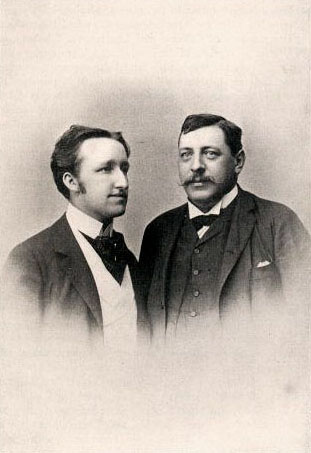
This photo of Siegfried Wagner (1869-1930) and Felix Mottl was published on a page of an unknown book in English; it is reproduced here courtesy of the Bibliothèque Nationale de France.
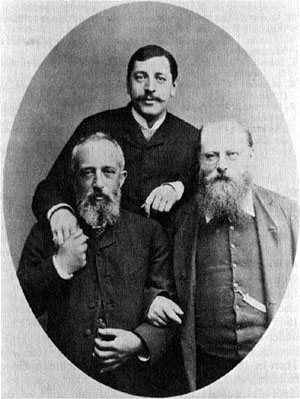
The above picture is from The New Grove Dictionary of
Music and Musicians, 1980, vol. 15, page 848, a copy of which is in our own
collection.
Mottl is seen here with Hans Richter (1843-1916) on the right and Hermann Levi
(1839-1900) on the left. Between them the three conducted most of the
performances at the Bayreuth Festival down to the 1890s.
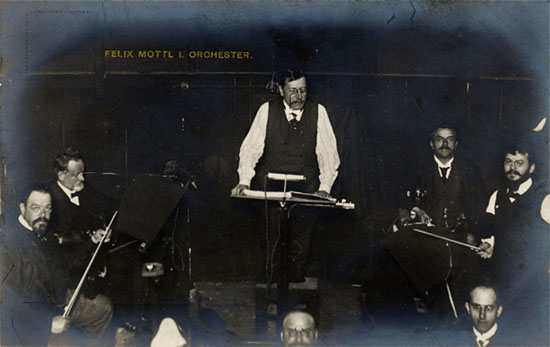
The above photo, reproduced on a postcard, shows Mottl rehearsing at the Munich opera house in 1908.
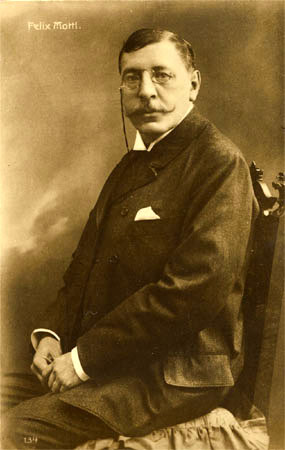
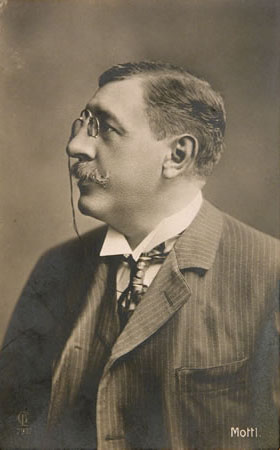
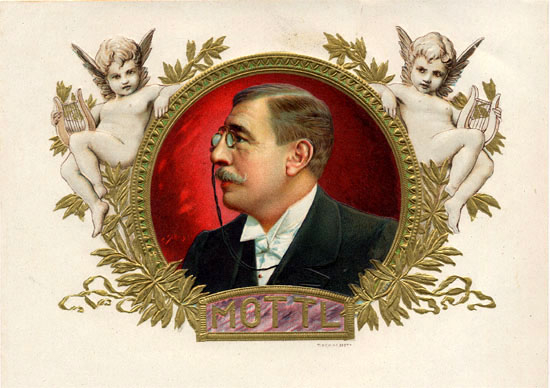
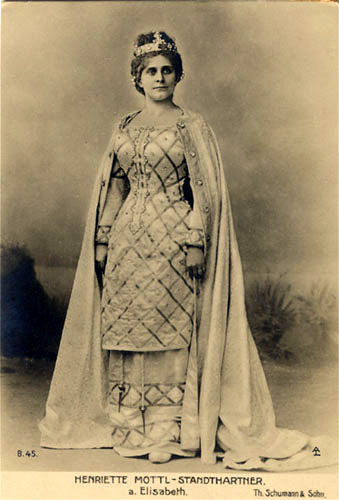
Henriette Standthartner was a Viennese by birth like Felix Mottl himself; the couple were married on 17 December 1892 and the following year she joined the Karlsruhe opera company. She sometimes appeared on her own, but she also frequently sang in concerts and operas under her husband’s direction; they appeared together in many tours abroad from 1895 onwards (for example in Brussels in 1897, 1898, 1900 and 1904; in Paris in 1897, 1898, 1899, 1900 and 1902, in London in 1895, 1896, 1897 and 1899). She sang title roles in Béatrice et Bénédict and les Troyens [Dido] in 1898 in Karslruhe. But her active career came to an end some time after her husband’s move to Munich; they were only formally divorced in 1910, but their relations had been deteriorating for several years before.
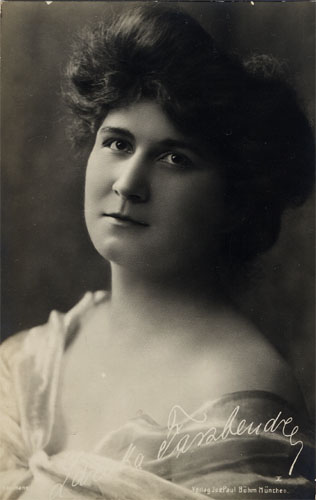
Zdenka Fassbender was first engaged by the Karlsruhe opera in 1899, then by the Munich opera from 1906. She sang Dido in several Munich productions of Les Troyens, and was married to Felix Mottl only days before his death on 2 July 1911. She continued singing at the Munich opera until 1932.
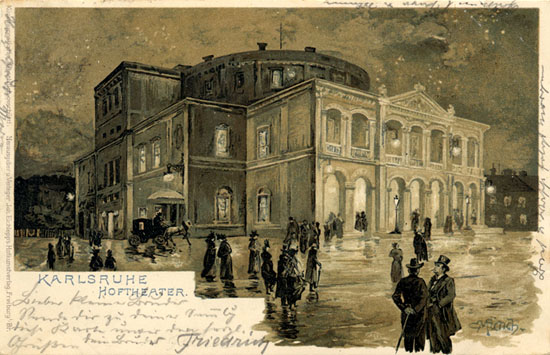
The theatre was built in 1852 by Heinrich Hübsch; the
interior was extensively refurbished
during the summer of 1898 in preparation for the following
season which included performances
of Béatrice et Bénédict and les Troyens.
This card was posted in Karlsruhe on 13 July 1899.
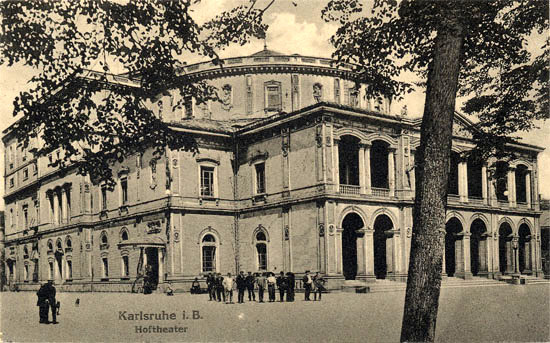
This card was posted in Karlsruhe on 25 October 1913.
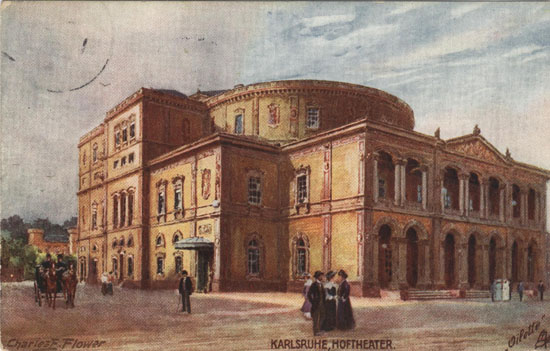
This card was posted in Karlsruhe on 27 December 1913.
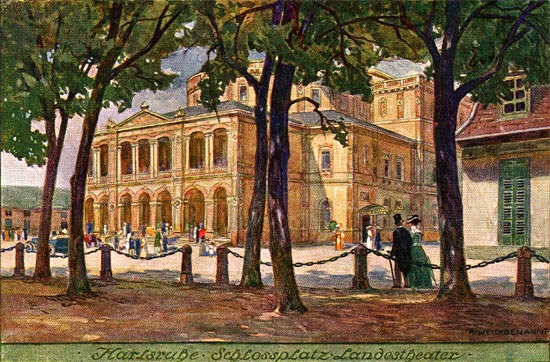
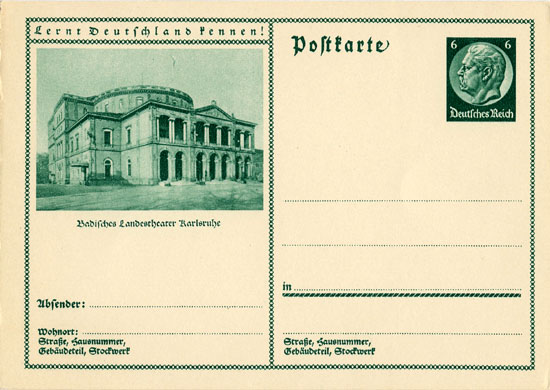
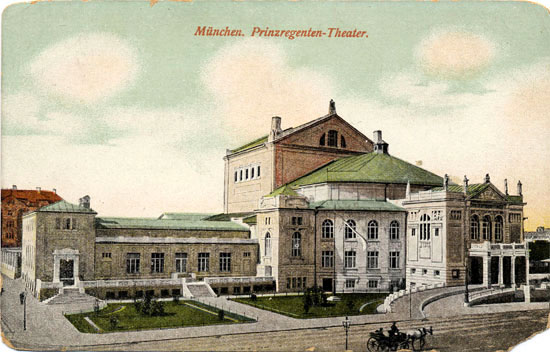
The construction of this theatre was decided by the Prince-Regent of Bavaria in 1899, and the new theatre, explicitly designed on the model of the theatre of Bayreuth, was inaugurated on 21 August 1901. It was in this theatre that Felix Mottl performed many operas, including those of Mozart, Wagner and Berlioz, during his appointment in Munich in the latter part of his career.
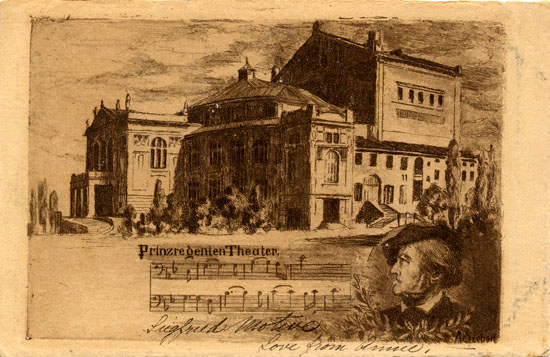
The musical citation is that of the Siegfried theme from the Ring: the theatre was intended in the first instance for the performance of Wagner’s operas (though many other works were to be played as well). In practice it rivaled Bayreuth as a centre for the performance of Wagner, and this led to some distancing in Mottl’s relations with Cosima Wagner.
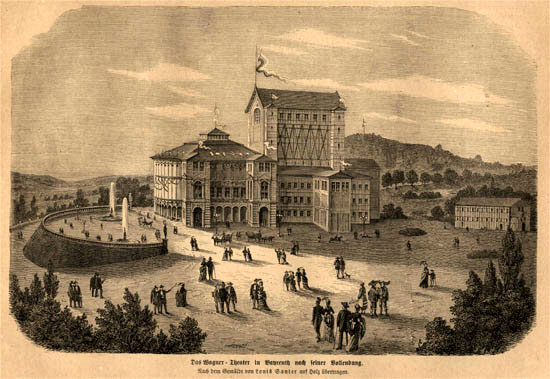
In 1871 Wagner decided on the construction of a new theatre at Bayreuth for the performance of his own operas, and laid the foundation stone for the theatre on 22 May of the following year. The construction of the theatre was finally completed in 1875, and in July of that year Mottl made his first visit to Bayreuth where he impressed Wagner with his knowledge of score of the Ring. He was invited by Wagner to assist in the preparations for the first festival and worked there from late May to the end of August 1876. Mottl first conducted at Bayreuth in 1886 and for the last time in 1906.
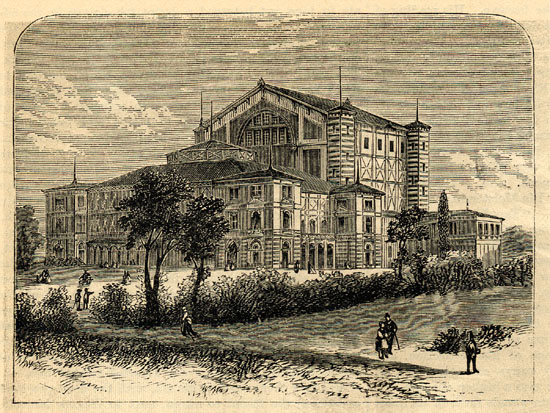
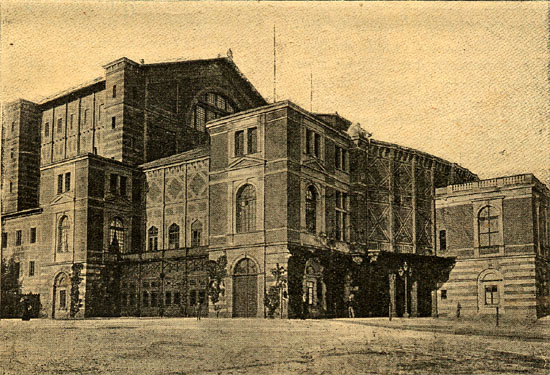
The above photo was published in A Travers Le Monde, No. 30, 23 July 1904, a copy of which is in our own collection.
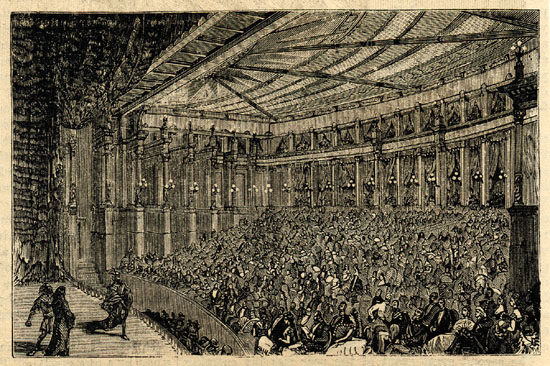
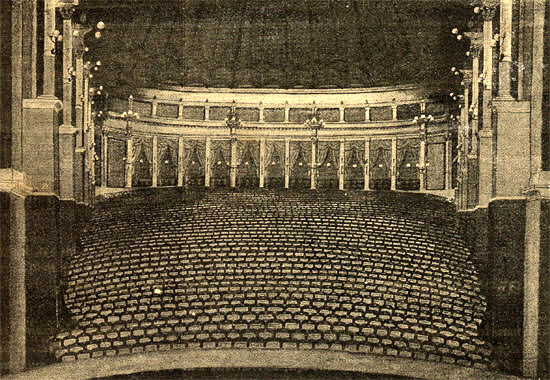
The above photo was published in A Travers Le Monde, No. 30, 23 July 1904, a copy of which is in our own collection.
The original copies of the programmes of 18 March 1894, 27 March 1898 and 18 November 1900 concerts reproduced in this section are in the Hector Berlioz Museum, which possesses a large collection of concert programmes. We are most grateful to the Museum for granting us permission to reproduce their scanned copies on this page. All rights of reproduction reserved.
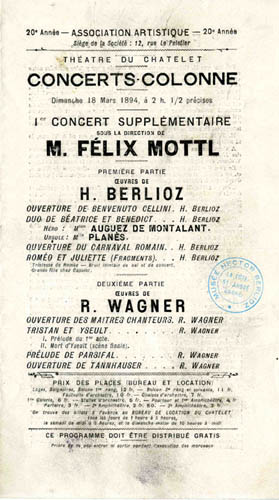
For a reproduction of pages 2-3 of the programme see the page on Georges de Massougnes.
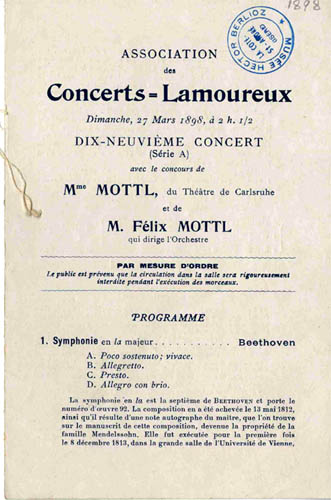
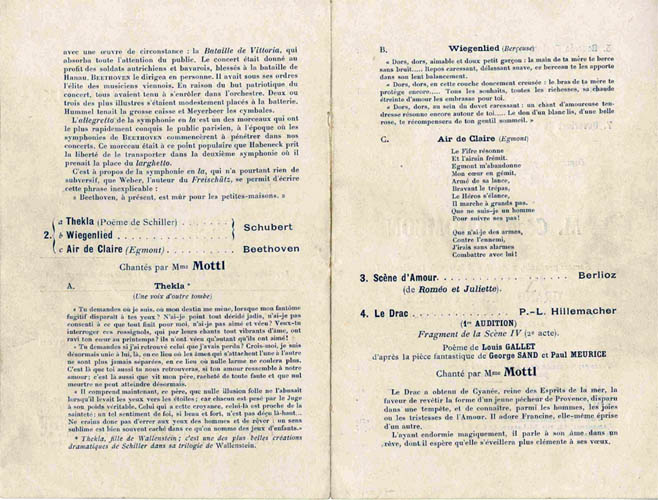
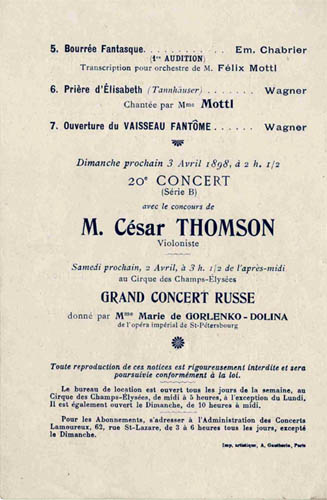
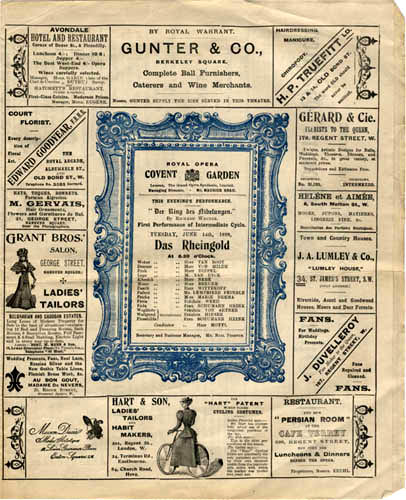
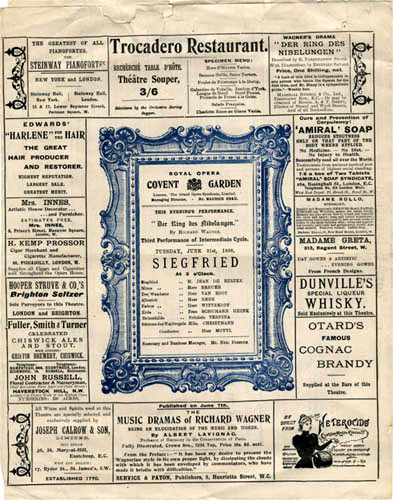
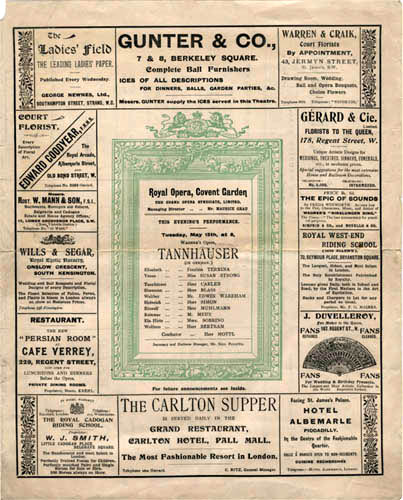
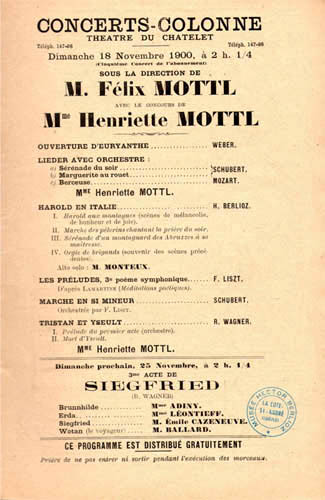
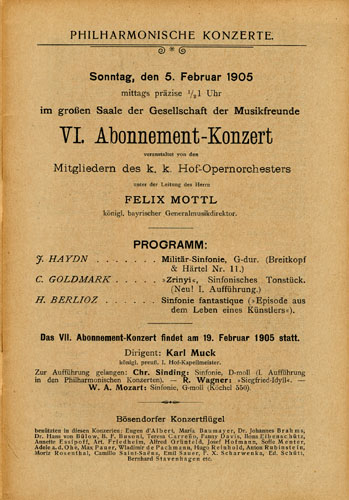
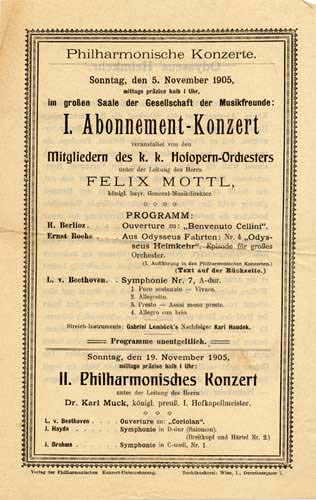
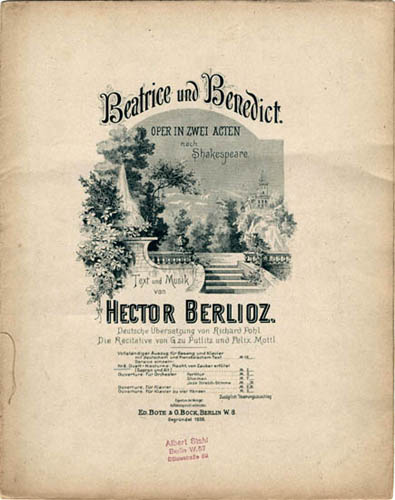
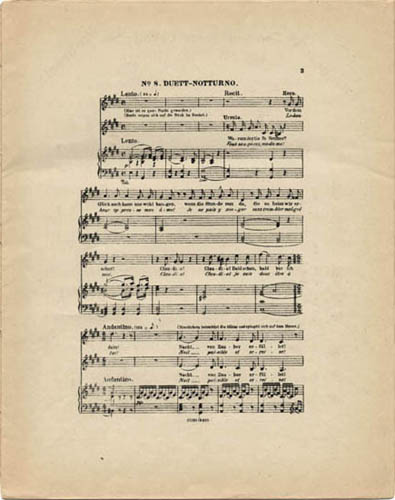
For the performance of Béatrice et Bénédict in 1888 Mottl substituted recitatives in place of the spoken dialogue of Berlioz which had been used for previous performances of the work in Germany in Baden-Baden in 1862-3 and Weimar in 1863. The text for the recitatives were written in collaboration with Gustav zu Putlitz, the manager of the Karlsruhe opera and himself a man of the theatre. These recitatives were published that same year and continued to be used in Germany after. The above illustrations are from a 1918 edition of the piano score in our collection issued by Bote & Bock in Berlin; they show the title page and the start of the duet at the end of Act I.
Mottl stayed here in March 1894 during his first visit to Paris.

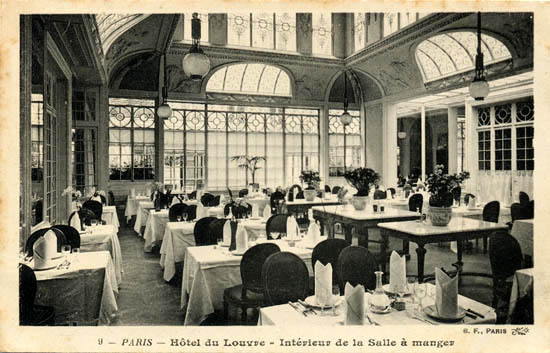
![]()
The Hector Berlioz Website was created by Monir
Tayeb and Michel Austin on 18 July 1997;
Page Berlioz: Pioneers and
Champions created on 15 March 2012; this page created on 11 December 2013.
© Monir Tayeb and Michel Austin. All rights reserved.